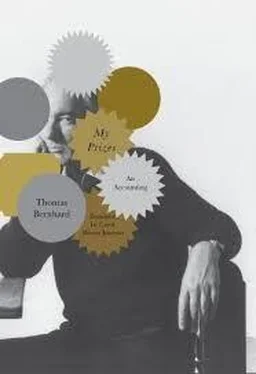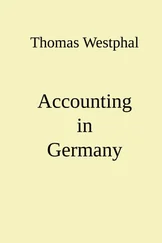The Anton Wildgans [1] Anton Wildgans (1881–1932), poet and playwright, author of dramas of earnest social criticism, became the director of the Burgtheater in 1930. A vocal defender of Austria’s independence against the National Socialists’ plan to annex Austria to Germany.
Prize
Anton Wildgans, like Weinhaber, is a Hölderlin of the Vienna suburbs who fits the soul of the people to a T. The prize that is named for him is funded by an industrial association that has its headquarters on the Schwarzenbergplatz in Vienna in a magnificent palace of the later nineteenth century. A week before I was to receive the Austrian State Prize, the president of the industrial association, Mayer-Gunthof, long since dead, informed me that the relevant jury had decided to give me this year’s prize, which is to say the prize for 1976. The president ended his letter with the customary formula that he was extremely pleased to be able to share this news with me. At the given moment, I receive the invitation to the ceremony. The prize is endowed with twenty-five thousand schillings. I didn’t give any thought to Wildgans, for I estimated him lower than my writer friends on the jury who, for whatever absurd reason, had hit upon the idea of awarding me the Wildgans Prize for 1976. In Austrian acting schools, it’s customary for the students to have a constant diet of Wildgans and above all they’re already learning a passage from Armut for the entrance exam and they spend their waking minutes reciting Wildgans poems and when it’s a question of holding some highly official state occasion, be it in the Burgtheater or in the so-called Josefstadt or even in some ministry, someone is sure to reach for something by Wildgans. The dilettante’s conception of Austrian poetry finds its ideal in Wildgans, as in Weinhaber, and practices it wherever there is a ceremony to be held, even today. What people admire in Wildgans is not only what they think of as his exceptionally sincere poetic art but, more importantly, the fact that he was once the director of the Burgtheater. What I myself always admired about Wildgans was his trombone-playing son, who was a musician of absolute genius and was among the most promising composers of his generation. But I don’t want to talk about Wildgans here, I want to talk about the prize that bears his name. A few days before the ceremony for the State Prize took place in the Ministry on the Minoritenplatz, the invitation reached me for the prize-giving in the Industrial Association, on a grandiose piece of letterhead printed by the famous firm of Huber & Lerner on the Kohlmarkt, and on which it was announced that Minister Piffl-Perčevič would be the special guest of honor. If, I thought, I want new storm windows to replace the old ones on my house which are almost totally rotted, I have to accept the prize, and so I had decided to take the Wildgans Prize and take myself off to the Löwenhöle Salon on the Schwarzenbergplatz. I mostly thought that one should take money when it’s offered and no one should waste time fussing around over the how and the where, all these reflections are nothing but total hypocrisy and so I ordered the storm windows from my local carpenter, the savings on heating costs will be considerable, I thought. No sensible person says no to twenty-five thousand schillings out of a clear-blue sky, whoever offers money has money and it should be taken from him, I thought. And the Industrial Association should be ashamed of funding a prize for literature with a mere twenty-five-thousand-schilling award, when they could fund it with five million schillings right there without even noticing it, but from their perspective, I thought, they’re valuing literature and literary figures quite accurately and I even was surprised at their estimate of literature and the literary figures who created it. I would have taken twenty-five thousand schillings from anyone, even the first person I met on the street. No one reproaches a beggar on the street for taking money from people without asking where they got the money they’re giving him. And it would have been utterly absurd to ask the Industrial Association, of all bodies, to actually have thoughts about their Yes or No, it would have been laughable. When I add the Industrial Association’s twenty-five thousand to the twenty-five thousand for the State Prize — both shamelessly low amounts for such purposes, I thought, the state should be as embarrassed as the Industrial Association, for they award literary prizes in amounts that would be a poor monthly salary for a middle-ranking municipal employee — that makes fifty thousand and with that I really could do something. The state awards a prize that’s no more than a shoddy pay packet and the Industrial Association does the same and both of them thus reveal themselves to the world, which totally fails to notice how vulgar and perverse this is. The Industrial Association with its millions or rather billions uses the giving of a shoddy prize sum of twenty-five thousand schillings to elevate itself to the lofty status of a truly exceptional Maecenas of Art and Culture and is even praised for this in every newspaper, instead of being denounced for their meanness with no regard for the consequences. But my intention wasn’t to denounce, merely to report. The Wildgans Prize was to be awarded a week after the State Prize. As per the invitation. But after, as I have reported, the State Prize ceremony exploded and the Minister slammed the door to the Audience Chamber in his Ministry with a huge bang and stormed out, the Industrial Association on the Schwarzenbergplatz suddenly lost their guest of honor for their planned Wildgans Prize award ceremony, for the Minister in his role as guest of honor had abruptly informed the Industrial Association that he did not wish to be the guest of honor at a ceremony whose central focus would be a certain Herr Bernhard , he declined and the Industrial Association was left standing. But because the Industrial Association no longer had their chief attraction, namely the Minister, at their disposal, they no longer wanted the writer Bernhard, with whom they had merely tried hypocritically to set themselves up as a Maecenas on a national scale. And what did the Industrial Association do? They canceled the entire ceremony and re-sent the same invitation cards they had had printed by Huber & Lerner on the Kohlmarkt and sent out two weeks before, not as in vitations now but as dis invitations. The celebration they had announced two weeks before would not take place and was canceled , it said on what I called the disinvitation cards , still in the same Hispano-Hapsburgian fashion of court announcements from Huber & Lerner, all in black and gold. I was sent this disinvitation minus any further communication about the whys and wherefores, just like the other invitees, and I was sent the prize certificate, also minus comment, in a shabby tube for printed matter that came by regular mail. Luckily they had also sent me, without comment, the twenty-five thousand schillings, a sum which in my view was completely inadequate for this whole tawdry outrage.
Shortly afterward I met Gerhard Fritsch, a member of the jury and my friend until then, in the Museum Café at the very table where Robert Musil used to sit, and asked him if after this disgusting business with the Industrial Association he was going to protest their behavior and step down from the jury and resign his seat. But Fritsch had no intention either of protesting or of stepping down from the jury. He had three wives and a whole bunch of children with these wives to take care of, he said, and could not indulge himself in any such protest even if it was self-evident to me, or any such self-evident resignation (self-evident to me, that is) from the Wildgans Prize jury. As a father of many children and provider for three female money-pits he felt really sorry for me and asked me to show him consideration in a tone that was repellent. The poor man, the malleable, pitiable, wretched man. Not long after this conversation Fritsch hanged himself from the hook on his apartment door, his life, which he’d bungled with no help from anybody, had closed over his head and extinguished him.
Читать дальше












